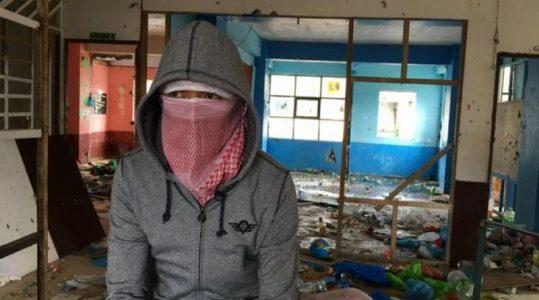
Islamist threat lingers in Philippines despite the Marawi victory
Abdul, his young face hidden by a headscarf, stares into the camera as he contemplates his shattered dream. He has lost dozens of friends. His family has been displaced.
“Our original plan was limited to attacking the military camp in Marawi and expelling the soldiers from the city,” he tells DW. The homegrown jihadi leaders who laid siege to Marawi under the banner of the “Islamic State” (IS) had convinced Abdul and his fellow fighters that the Philippine government would then withdraw. “They told us we would get what we had always wanted: an Islamic state here in Marawi.”
More than a year after the heaviest urban fighting in the Philippines since World War II, the historic center of Marawi, the country’s largest Muslim city on the southern island of Mindanao, remains sealed off. Systematic air raids, heavy artillery fire and merciless house-to-house combat turned the area into a bombed-out ghost town with skeletal buildings that evoke the war-ravaged ruins of Aleppo, Raqqa and Mosul in the Middle East.
Just over 5 percent of the Filipino population is Muslim; the vast majority are Roman Catholics. More than 90 percent of all Muslims — about 6 million people — live on Mindanao and the smaller neighboring islands of Basilan, Sulu and Tawi Tawi. But even here, they are in the minority.
There’s a prevailing sense of injustice here, dating back to the Spanish colonizers who introduced Christianity in the 16th century and subjected the local indigenous and Muslim population to their “pacification” campaign. Then came the United States, briefly followed by Japanese forces in the 20th century. And today there are the so-called “imperialists” in the capital, Manila, up north.
Abdul is convinced the vast majority of Filipino politicians are corrupt and dishonest. He also believes the government is sending “Christian settlers” to Mindanao to squeeze out Muslims like him.
The dream of an Islamic state became his panacea against unemployment, poverty and anger. His family has traditionally supported the largest Muslim rebel group, the Moro Islamic Liberation Front (MILF). But Abdul chose to secretly join the Maute extremists who had sworn loyalty to IS.
The group’s leaders, Abdullah and Omar Maute, had spent many years in the Middle East adopting a radicalized outlook on life and religious interpretation. For several months after his recruitment in the spring of 2015, Abdul went to a Maute training camp in the jungle where he learned how to handle guns and knives, enjoying what he calls the “feeling of brotherhood.”
Via Telegram, WhatsApp and other social media channels, Abdul and his friends regularly received translated IS propaganda videos and sermons from Syria and Iraq. Abdul says there were also about 30 foreign fighters in his camp, mainly from neighboring Indonesia and Malaysia, but also from Arab countries. DW has been unable to independently verify his account.
At the end of his jungle training, Abdul received a Kalashnikov rifle and the equivalent of €160 ($182). It was not a one-off sum, but the first payment of a regular monthly salary to prepare him for the future battle.
Long years of violence in Mindanao have created a dangerous vacuum. As a result, clan rule, criminal networks, corruption and jihadi splinter groups have flourished.
Abdul admits to having used his new weapon in clashes between two rival Marawi families, killing without remorse. “Even if you personally have no enemies, the enemies of your clan are your enemies. That’s how it is here,” he says.
Source: DW





